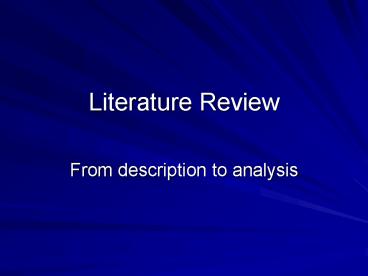Literature Review - PowerPoint PPT Presentation
1 / 13
Title:
Literature Review
Description:
Literature Review From description to analysis What is the purpose of a literature review in a research proposal? To introduce the topic area(s) Define the terms ... – PowerPoint PPT presentation
Number of Views:120
Avg rating:3.0/5.0
Title: Literature Review
1
Literature Review
- From description to analysis
2
What is the purpose of a literature review in a
research proposal?
- To introduce the topic area(s)
- Define the terms (words) that are being used
- To summarise existing knowledge of the topic
area(s) - To draw from the experiences and results of other
researchers some possible answers/solutions/causes
that could be investigated - To be able to conclude with a model/hypothesis
which will be tested in your organisation
- Descriptive
- Descriptive
- Synthesising
- Analysing
- This is where you identify very specifically what
aspects/questions you will be researching
3
What is synthesis?
- Identifying several authors/sources who have
researched the topic area(s) - Compare what they are saying
- Contrast what they are saying
- Now apply your knowledge to your organisations
situation
- Use textbooks e-resources
- What are the similarities?
- What are the differences?
- This is where the analysis happens
4
What is a model or hypothesis?
- A model is a picture of what the researcher is
proposing to research. Models tend to be used in
social science and humanities research
5
What is a model or hypothesis?
- A hypothesis is a series of questions the
researcher is trying to answer. Hypotheses are
often linked to scientific (quantitative)
research
- A null hypothesis is suggested which is often a
negative statement with the intention of proving
the negative statement wrong so that the
alternative hypothesis must be right!
6
Preparing a Search Profile
- Review questions, search terms
- Determine importance of criteria for inclusion /
exclusion in the review (consider your research
aims objectives) - Systematic literature review method
- Theoretical rigour
- Methodological rigour
- Coherence of research designs and execution
- Quality of argument
7
Searching
- Plan Search Profile
- Record your searches (search diary)
- Identify sources places, journals, people
- Logical approach
- Own library and other library catalogues
- Book bibliographies
- Journal abstracts, indexes and contents lists
- Institutions and people
- Google Scholar
- Saving/ cataloguing literature
- Example Using the Library to search for Articles
8
? How to read/ review papers 1
- NB Reading for a review is very different from
reading for pleasure!!
Purpose
Decision
Action
Check if it is useful for your research
Not useful
Read the abstract
1
STOP
Seems useful
Note its structure, topic, style, general
reasoning, data and references
Skim through the paper
Not useful
2
STOP
Seems useful
Try to identify the ideas, aims and logic for the
work
Read the introduction conclusions
Not useful
3
STOP
Seems useful
Identify the rationale for the study (theory
method), extract main concepts and check how they
were defined used
Tip! Take notes in a systematic way
Read the sections important for your needs
4
9
? How to read/ review papers 2
- Examples of Categorising streams of thought
What are the main questions and problems that
have been addressed to date?
What are the key theories, concepts and ideas?
What are the key sources?
Literature search and review your topic
How is knowledge on the topic structured and
organised?
What are the methods used?
What are the origins and definitions of the topic?
Does it reference any other relevant literature/
research?
What are the major issues and debates about the
topic?
10
Content of the Critical Review
- The literature review represents the body of
research on which the author should seek to
ground the proposed framework and to reflect the
aim of his/her research - Your critical review will need to
- Include the key academic theories within your
chosen area - Demonstrate that your knowledge is up to date
- Show how your own research relates to previously
published research - Assess the strengths and weaknesses of previous
research
11
Critically reviewing
- critical review is a difficult notion
- Includes evidence of
- Evaluation of sources
- Evaluation of arguments by authors
- Evaluation of methods used by authors
- Evaluation of utility (i.e. Strengths and
weaknesses) - Example Literature Analysis Table (ideas for a
thematic analysis) - NB Reasoned evaluation (not simply opinion)
12
Writing
- Look at examples in methods books articles in
refereed journals - Report literature review methods (even if only
briefly) - Draw conclusions relevant to your project
13
? Writing your review
- What is the aim of your review?
- To define topics? / map out theories?
- To establish a context?
- Give a coherent structure or order eg
- Discuss in chronological order
- Group into topics or themes
- Compare, contrast, critically analyse
- What are the different view points
- What are the positives? What are the drawbacks?
- What do you think? What does this mean in
relation to your research/ topic? - Summarise your review
- Don't forget to give a summary of the main points
at the end - Make sure you explain the importance of all the
literature for your research











![[PRESENTATION] How to write literature review PowerPoint PPT Presentation](https://s3.amazonaws.com/images.powershow.com/9158769.th0.jpg?_=20181012061)



















